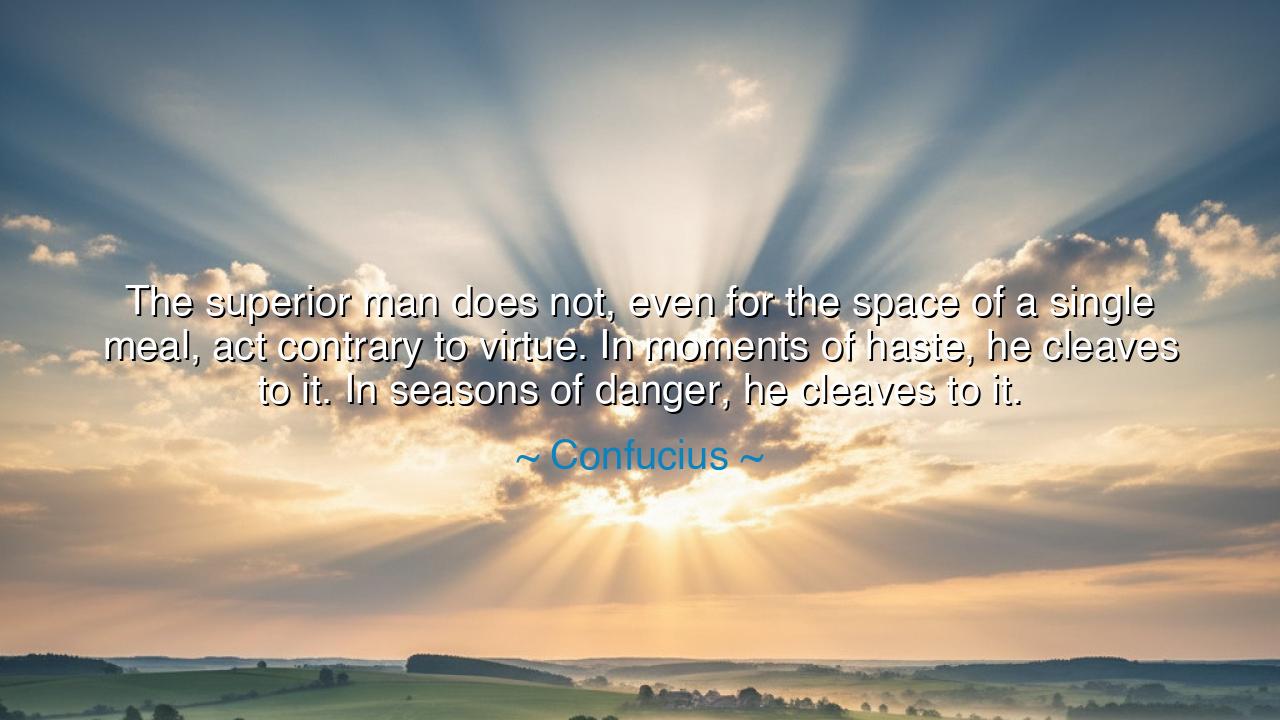
The superior man does not, even for the space of a single meal
The superior man does not, even for the space of a single meal, act contrary to virtue. In moments of haste, he cleaves to it. In seasons of danger, he cleaves to it.






Hear the immortal wisdom of Confucius, master of harmony and teacher of generations: “The superior man does not, even for the space of a single meal, act contrary to virtue. In moments of haste, he cleaves to it. In seasons of danger, he cleaves to it.” These words are not mere instruction, but a call to live with unwavering integrity, for they reveal that true greatness is not tested in times of ease, but in the hours when temptation, fear, and chaos press heavily upon the heart.
The meaning is this: the superior man—the one who seeks wisdom, righteousness, and balance—guards his conduct with constancy. He does not abandon virtue for convenience, not even for the brief space it takes to eat a meal. When life demands quick choices, when haste would drive others into folly, he holds fast to what is right. And when shadows gather, when danger threatens body and soul, he does not betray his principles for safety. Virtue is his anchor, his compass, his breath. To part with it, even briefly, would be to lose himself entirely.
The origin of these words lies in Confucius’s mission to shape the moral character of individuals so that society itself might flourish. In the China of his age, kingdoms crumbled and wars raged; rulers sought advantage through deceit, and men abandoned principle for survival. Against this chaos, Confucius raised the standard of virtue, teaching that only by cultivating constancy in the individual could harmony return to the world. His teaching of the superior man became the model: one whose life was ordered by righteousness, loyalty, and benevolence, unshaken by circumstance.
History confirms this wisdom. Recall the story of Marcus Aurelius, emperor of Rome, who even in the midst of war and plague remained steadfast in his Stoic virtues. Though he had power enough to indulge himself or crush his enemies without consequence, he chose justice, moderation, and compassion. In both haste and danger, he cleaved to his principles, and thus became remembered not only as a ruler, but as a philosopher-king. His life illustrates Confucius’s teaching: greatness lies in constancy of virtue, not in the shifting tides of circumstance.
Think also of Mahatma Gandhi, who, when beaten, imprisoned, and threatened, refused to abandon nonviolence. Many urged him to compromise, to retaliate, to bend in the seasons of danger. But he held to his virtue, not only in the great decisions of history, but in the smallest details of daily life. His fidelity to principle became his strength, turning frailty into power and inspiring a nation to freedom.
The danger for us lies in believing that virtue is optional, to be followed when convenient but cast aside in urgency or peril. To act rightly only when it costs us little is no true righteousness. The words of Confucius remind us that virtue is proven in the small moments, in the “space of a single meal,” as much as in the crises of life. Integrity cannot be divided; either it is whole, or it is lost.
The lesson is clear: let us become people of constancy. Cleave to virtue in the quiet hours, in the ordinary tasks, for by this habit you will stand firm in the greater storms. Train yourself in righteousness daily, so that in haste you will act rightly without hesitation, and in danger you will hold to truth without fear. Virtue is not a garment to be worn and discarded, but the very fabric of the soul.
Take this as a guiding flame: “The superior man cleaves to virtue, in haste and in danger alike.” Let your life be a testimony of constancy. For the world is filled with shifting shadows, but the one who holds firmly to virtue shines as a lamp for others, steady and unyielding, across the ages.






AAdministratorAdministrator
Welcome, honored guests. Please leave a comment, we will respond soon